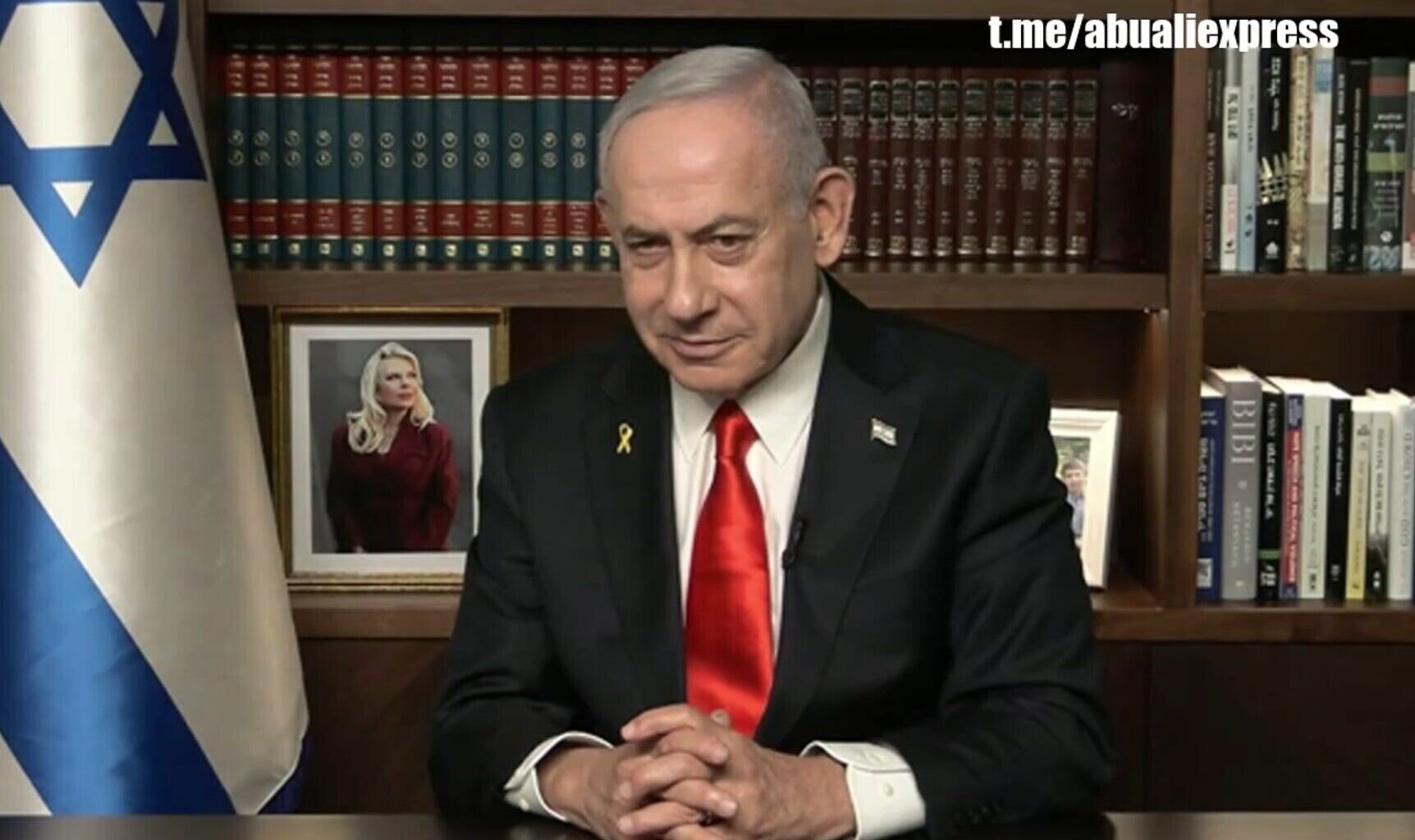Prime Minister Benjamin Netanyahu insisted that there will not be a Palestinian state, even at the cost of normalization with Saudi Arabia, during an interview aired on Thursday evening.
“There will not be a Palestinian state. It’s very simple: it will not be established,” the premier said in the wide-ranging interview with Abu Ali Express, a popular local Telegram channel.
Asked by the interviewer if his opposition holds even if it jeopardizes normalization with Riyadh — which insists on a credible pathway to Palestinian statehood in exchange for such ties – Netanyahu said: “The answer is: a Palestinian state will not be established. It is an existential threat to Israel.”
Asked about what has prevented normalization with the Saudis, Netanyahu said the war in Gaza strained progress, but that “the conditions could develop” now that the war is winding down.
“But the conditions must be acceptable to both sides – terms that are good for both sides,” he said. “I know how to stand firm on our essential conditions and not endanger our security. And if this process ripens later on, excellent. And if not, we will safeguard our vital interests.”
Get The Times of Israel’s Daily Edition
by email and never miss our top stories
By signing up, you agree to the terms
Earlier in the week, Saudi Crown Prince Mohammed bin Salman said that Riyadh wants to join the Abraham Accords, but called for the need to secure a path toward a two-state solution, while meeting US President Donald Trump at the White House.
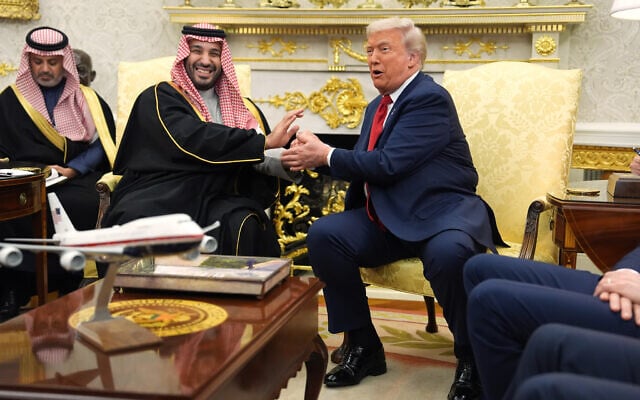
President Donald Trump meets Saudi Arabia’s Crown Prince Mohammed bin Salman in the Oval Office of the White House, November 18, 2025, in Washington. (AP Photo/Evan Vucci)
Turning to the Gaza Strip, Netanyahu told the channel that Israel will reopen the Rafah border crossing on the Egypt-Gaza border after it receives the three remaining deceased hostages from Hamas, adding that Israel is “very close to completing” the process.
“We agreed that we will open the crossing after we receive all our hostages. We are very close to completing this process — it’s set to happen — and once that is completed, we will open the crossing,” the premier said.
Netanyahu added that, once all the hostages are returned and the crossing is reopened, he “will be very happy to see Egypt allowing any Gazan who wants to leave [through the crossing] to do so — because that has not happened until today.”
“Any Gazan who wants to leave should be able to, and that right has been denied to them,” he continued, adding that Washington’s 20-point plan for Gaza “included that right: it sets out the principle that any Gazan who wants to leave can leave. You’re not expelling anyone, but if a person wants to leave, let them leave. If Egypt accepts that — I think that’s very positive.”
The Palestinian Authority embassy in Egypt has pushed for the reopening of the crossing, which has been largely closed since Israeli forces entered Rafah in May 2024, to allow Palestinians residing in Egypt to return to Gaza. Egypt has repeatedly vowed to block any “displacement” of Gazans from the war-torn Gaza Strip, calling it a “red line” for Cairo.
Deal with Syria ‘preferable,’ but border defense will hold ‘with or without agreement’
A day after visiting an outpost in the IDF-held buffer zone in southern Syria, Netanyahu said that a security agreement with Damascus was his favored option but that Israel won’t compromise on border security and protecting minorities in the neighboring country.
“I believe Syria has an interest — no less than Israel, and perhaps even more — in reaching a security agreement with us,” the premier said.

Prime Minister Benjamin Netanyahu (foreground) visits IDF troops in southern Syria, accompanied by IDF Chief of Staff Lt. Gen. Eyal Zamir (right), November 19, 2025. (Kobi Gideon/GPO)
Asked about Syrian President Al Sharaa’s interest in such an arrangement, which has been under US-mediated negotiation, Netanyahu said that “there are various conditions involved — I won’t get into that.”
“But the important point is this: Israel is a very strong country. Israel is very determined. We will not allow threats to develop against us from southwest Syria, and we are also determined to protect our Druze allies” in the country, he said.
“Whether Syria wants to do this through an agreement — that is a separate question. In my view, an agreement is preferable. But the principles of defending our borders and defending our allies will be upheld in any case — with or without an agreement,” he said.
Israel also wants to reach an arrangement with Turkey, Netanyahu said, but can’t rule out the country becoming a threat to the Jewish state.
“I hope that threat doesn’t materialize, but we can’t rule it out,” Netanyahu told the Abu Ali Express.
Relations between the two countries — formerly close allies — collapsed once again during the two-year war in Gaza, as Turkish President Recep Tayyip Erdogan praised the Hamas terror group and accused Israel of committing genocide.
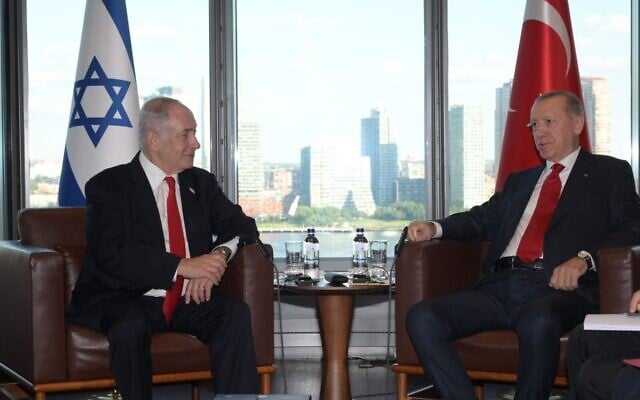
Prime Minister Benjamin Netanyahu meets Turkey’s President Recep Tayyip Erdogan on the sidelines of the UN General Assembly in New York on September 19, 2023. (Avi Ohayon/GPO)
“We prefer a modus vivendi with Turkey,” Netanyahu continued. “They’re very stubborn and speak in an extreme way, and we push back on it. But in practice, we prevented their entry into southern Syria. They wanted to come in near our border — I said this will not happen. We also didn’t want them entering central Syria at the T-4 base — and we even struck that airfield.”
At the same time, Netanyahu said, Israel “maintains dialogue beyond the headlines, telling them there’s mutual interest in avoiding confrontation.”
Despite the attempts by Israel to find ways to reduce tensions, Israel’s military force design moving forward will be affected by what capabilities Turkey develops, he said.
“We do not intend to relinquish our military superiority,” Netanyahu stressed.
“We’re not seeking enemies, but we won’t let any country in the region threaten us.”
Asked about the possibility of Turkey receiving the F-35 from the US after Saudi Arabia, Netanyahu said, “That possibility is extremely distant, if it even exists at all.”
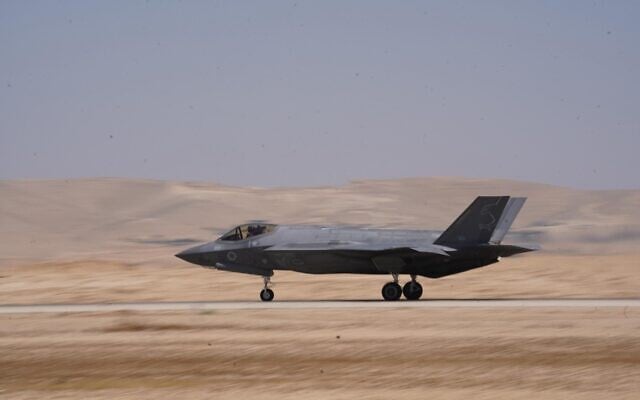
Israeli Air Force F-35I fighter jets depart for strikes in Iran, June 13, 2025. (Israel Defense Forces)
Israel aims to build independent arms production to reduce reliance on US
Netanyahu also said he is working on an initiative to develop Israel’s independent munitions production with minimal dependence on the US — Israel’s primary defense partner and arms supplier — in the coming decade.
“I’m currently holding discussions — including a very serious four-hour meeting yesterday — on our armament plans for the coming decade, and there are several components involved,” Netanyahu told Abu Ali Express.
“The most important thing is that we want to strengthen our independent capabilities… the central point is that I want to eliminate, or at least significantly reduce, our dependence on external supplies — even from very good and truly loyal friends like the United States. I want us to be as self-reliant as possible,” the premier continued.
Netanyahu said he wants the IDF’s combat capabilities to continue “surpassing every other actor in the region,” saying this “requires a complex reorganization — significant resources and many decisions.”
“We need to signal to every actor in the region — friendly, less friendly, and hostile — that Israel is the strongest country here… That is the policy. It’s called peace through strength,” he said.
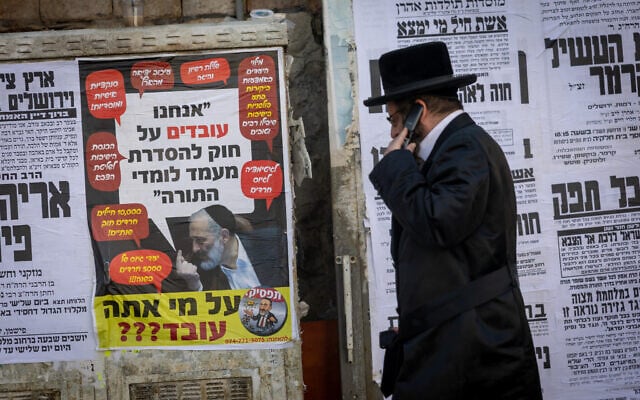
A poster showing Shas leader Aryeh Deri saying “We are working on a law to regulate the status of Torah students,” with the text underneath reading, “Who are you fooling?” in an ultra-Orthodox neighborhood of Jerusalem on October 28, 2025. (Chaim Goldberg/FLASH90)
Haredi public expected to give conscription bill a chance
Turning to the matter of ultra-Orthodox military conscription, Netanyahu said the Haredi enlistment bill that he wants to pass will bring 17,000 ultra-Orthodox soldiers into the IDF within three years.
“I expect the Haredi public to join this, to give this a chance. I want the rabbis to allow support” in the Knesset, he said.
For the past year, the Haredi leadership has pushed to pass a law largely keeping its constituency out of the IDF, after the High Court ruled that decades-long blanket exemptions from army duty traditionally afforded to full-time Haredi yeshiva students were illegal.
Some 80,000 ultra-Orthodox men aged between 18 and 24 are currently believed to be eligible for military service, but have not enlisted. The IDF has said it urgently needs 12,000 recruits due to the strain on standing and reserve forces caused by the war against Hamas in Gaza and other military challenges.
